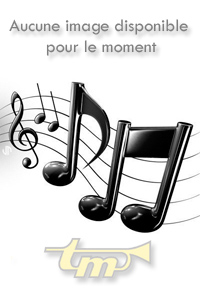Nous utilisons des cookies pour améliorer votre expérience utilisateur. Pour se conformer à la nouvelle directive concernant la vie privée, nous devons vous demander votre consentement pour définir des cookies. En savoir plus.
<< Retour à l'aperçu

Festival Bong-Ji-Ga

Partitions pour orchestre d’harmonie.
| Article no.: | BRZYDOPA01 |
|---|---|
| Compositeur: | Soo-Hyun Park |
| Niveau: | 4 |
| Durée: | 8:00 |
| Editeur: | Brain Music |
Disponible dans ces catégories
À partir de
165,00 €
TTC
Disponibilité :
En stockExpédié :
Sous 1 jour ouvrable1. Future Bong-Ji-Ga | 2. Natural Bong-Ji-Ga | 3. Festival Bong-Ji-Ga
This work was commissioned by the Jeju International Wind Ensemble Festival Organizing Committee to celebrate the 20th anniversary of the Jeju International Wind Ensemble Festival in 2015; it premiered at the festival's opening concert at Seogwipo Art Hall of Fame on August 8th, conducted by Mr. Lee Dong-ho, performed by Seogwipo City Municipal Wind Orchestra. The Japanese premiere was performed by Tohoku Fukushi University Wind Orchestra at their 38th regular concert, conducted by Mr. Yasunori Matsuzaki, on December 20, 2015.
The piece consists of three movements based on the Jeju Island folk song called "Bong-Ji-Ga": "Future" - Dynamic sounds representing the future and urbanity of Jeju; "Nature" - slowly expressing the natural beauty of Jeju; "Festival" - portraying lively festivals and folk dancing.
The word "bongji" is from the Jeju dialect, meaning flower blossom. When spring flowers fall, trees start to bear fruit. "Bongjiga"
is of those songs celebrating nature's seasonal cycles, anticipating rich harvests in the fall.
Original (ethnic) music has distinctive rhythms blending 8/6, 8/9, 8/12 and singing, but in this work, the third movement from rehearsal letter O is the most original presentation of the melody. The melody is freely developed in the first movement, and "sung" with calm expression in the second movement, so it is interesting to study how this folk song is being reconstructed. Consider these ideas for performance as well.
Aside from that, Seijo is also the birthplace/hometown of my mother's grandparents. I have composed several works dealing with Korean folk songs of Jeju, but having the opportunity to present this work on Nishijira's folk songs in the area of Seogwipo (as I was born and raised in Osaka) offers something special and deeply emotional for me.
(Soo-Hyun Park)
This work was commissioned by the Jeju International Wind Ensemble Festival Organizing Committee to celebrate the 20th anniversary of the Jeju International Wind Ensemble Festival in 2015; it premiered at the festival's opening concert at Seogwipo Art Hall of Fame on August 8th, conducted by Mr. Lee Dong-ho, performed by Seogwipo City Municipal Wind Orchestra. The Japanese premiere was performed by Tohoku Fukushi University Wind Orchestra at their 38th regular concert, conducted by Mr. Yasunori Matsuzaki, on December 20, 2015.
The piece consists of three movements based on the Jeju Island folk song called "Bong-Ji-Ga": "Future" - Dynamic sounds representing the future and urbanity of Jeju; "Nature" - slowly expressing the natural beauty of Jeju; "Festival" - portraying lively festivals and folk dancing.
The word "bongji" is from the Jeju dialect, meaning flower blossom. When spring flowers fall, trees start to bear fruit. "Bongjiga"
is of those songs celebrating nature's seasonal cycles, anticipating rich harvests in the fall.
Original (ethnic) music has distinctive rhythms blending 8/6, 8/9, 8/12 and singing, but in this work, the third movement from rehearsal letter O is the most original presentation of the melody. The melody is freely developed in the first movement, and "sung" with calm expression in the second movement, so it is interesting to study how this folk song is being reconstructed. Consider these ideas for performance as well.
Aside from that, Seijo is also the birthplace/hometown of my mother's grandparents. I have composed several works dealing with Korean folk songs of Jeju, but having the opportunity to present this work on Nishijira's folk songs in the area of Seogwipo (as I was born and raised in Osaka) offers something special and deeply emotional for me.
(Soo-Hyun Park)
Concert & Festival,Z-YDOP-A01S,Z-YDOP-A01A,BRZYDOPA01S,BRZYDOPA01A
 Français
Français Nederlands
Nederlands  English
English  Deutsch
Deutsch 
